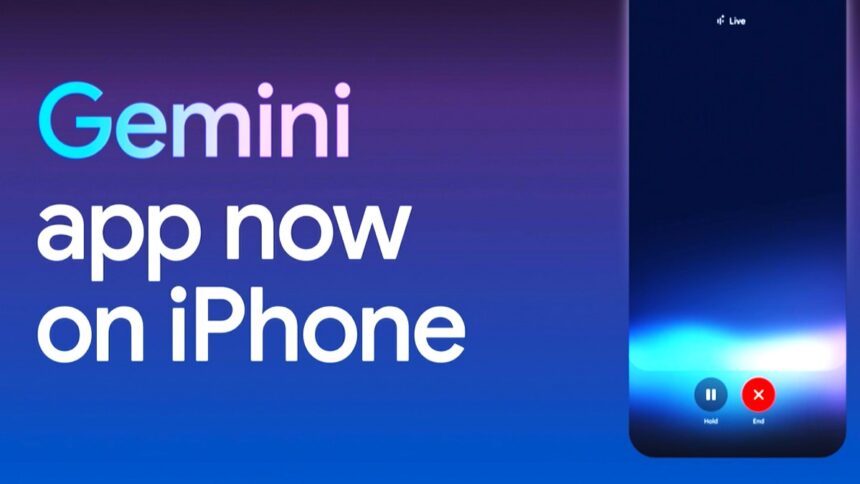Google Gemini AI Launches Standalone iPhone App with Gemini Live FeatureGoogle’s AI assistant makes a major leap onto iOS with new functionality, including voice and camera interaction.
Google’s much-anticipated Gemini AI now has its own standalone app for iPhone users, marking a significant step in the company’s bid to make its AI assistant a more integrated part of everyday mobile life. While Google’s AI-powered virtual assistant has been available within the Google app and on the web for some time, this new app makes Gemini much more accessible and brings new features that could make it a worthy competitor to Apple’s own Siri.
The Gemini app, which launched quietly on the App Store this week, offers a streamlined interface that makes it easier for iOS users to interact with Google’s chatbot. With a focus on simplicity, the app presents users with just a chat window and a list of past conversations, allowing quick access to a wide range of capabilities, from simple queries to more interactive conversations.
What’s New in the Gemini iPhone App?
The core functionality of the Gemini app is similar to what iPhone users have experienced through the Google app or by visiting Gemini’s website. You can use the app to ask questions or give commands, with responses delivered via text, voice, or even through the camera. However, the standout feature of this app, especially for iPhone users, is Gemini Live—a more dynamic, conversational AI mode that allows users to interact with the bot in a more natural, spoken dialogue.
Previously available only on Android devices, Gemini Live is now making its debut on iOS. This conversational mode offers a smoother, more human-like interaction, similar to features like ChatGPT’s voice mode. The integration of Gemini Live adds another layer of accessibility and functionality to the Gemini app, offering a more engaging, responsive AI experience. When using Gemini Live, interactions even appear on your iPhone’s Dynamic Island and lock screen, providing a real-time interface for ongoing conversations.
While Gemini Live is certainly the most exciting new feature for iPhone users, it’s worth noting that the app retains all the traditional functionalities of the Gemini chatbot, including its ability to tap into other Google services. You can ask Gemini to play music via YouTube Music, get directions through Google Maps, or access other Google apps—all without having to manually open each app individually.
Google $GOOGL just launched its dedicated Gemini AI app for iPhone users – MacRumors pic.twitter.com/izYH9aHkQl
— Evan (@StockMKTNewz) November 14, 2024A More Integrated Experience for iPhone Users
For iPhone owners, the introduction of the Gemini app marks a significant change in how Google’s AI can be used on Apple devices. While Google’s AI assistant has long been available within the Google app, this new standalone app gives Gemini more visibility on the homescreen and makes it much easier to access with a single tap. The simplicity of the app’s design—essentially just a chat interface—ensures that users can start chatting with the AI almost instantly.
For now, the Gemini app on iOS doesn’t offer deep integration with Apple’s own native apps like Siri does. It can’t change system settings or interact with iPhone-specific apps, which limits some of its potential. But it does offer a significant advantage over Siri in terms of integration with Google’s ecosystem. Gemini can help users search through their Gmail, Google Docs, Drive, and Sheets, making it particularly useful for those who are already entrenched in Google’s suite of productivity tools.
The app’s main purpose is to get iPhone users to engage with Google’s AI in a way that becomes part of their regular routine. Like Siri or other virtual assistants, Gemini can answer questions, provide recommendations, and assist with basic tasks, but it’s also optimized to work seamlessly with Google’s broader suite of services.
Gemini Live: The Future of Voice Assistants?
One of the key differentiators of the new Gemini app is the addition of Gemini Live, a feature that allows for more fluid, natural interactions with the AI. The feature lets users speak directly to the bot, much like using Siri or Alexa, but with a more conversational and dynamic touch. The AI responds with one of several voice options, including a British-sounding voice that is likely to be the default for many users.
Gemini Live offers the ability to interrupt the AI mid-sentence, ask follow-up questions, and even provide corrections or clarifications, all while maintaining the flow of conversation. This more human-like interaction is what sets Gemini apart from more static assistants, and it could play a key role in how users interact with AI in the future. However, like other AI systems, Gemini Live isn’t without its quirks. The feature works well in many contexts but occasionally stumbles with complex or specific queries.
For example, while Gemini Live can provide quick answers to general questions and even offer rudimentary step-by-step instructions for tasks like recipes or crafting holiday templates, its ability to handle highly specialized or technical requests is still limited. In one test, the AI could offer basic advice for cooking with a potentially poisonous mushroom, but it still lacked the nuance needed to confidently answer all types of complex questions.
What Does This Mean for Siri and Apple’s AI Future?
The arrival of Gemini on iPhone highlights the growing competition between Google and Apple in the realm of AI-powered assistants. Siri, once the leader in this space, has faced increasing pressure to evolve as rival platforms, like Google Assistant and Alexa, have raised the bar. While Siri has been gradually improving, particularly with features introduced in iOS 18, it’s clear that the gap between Apple’s and Google’s AI assistants is widening.
Apple’s Siri is still largely confined to performing specific, pre-programmed tasks, and it lacks the broader conversational capabilities of Gemini Live. However, Apple is working on expanding Siri’s functionality, with a focus on making it more contextually aware and better integrated with apps across the system. For example, Apple’s Apple Intelligence suite, which was introduced at WWDC 2023, promises to bring more intelligent app integration, allowing users to perform tasks like creating calendar events from emails or automatically pulling information from messages.
Gemini’s expansion to iOS could be a preview of what Siri might eventually become. Apple has also integrated third-party AI tools like ChatGPT and Google’s own Gemini into some of its apps, signaling that it may be open to embracing external AI platforms.
The Race for Your Homescreen
Google’s launch of the Gemini app on iOS is part of a larger trend where tech giants are seeking to embed AI more deeply into our daily mobile experiences. The key to success will be ubiquity—how easily users can integrate these AI tools into their routines and workflows.
While the Gemini app on iOS is still catching up to its Android counterpart, it’s clear that Google is betting on its AI to become a core part of how people interact with their smartphones. For Apple, the arrival of Gemini on iPhone further illustrates the growing importance of AI in mobile ecosystems, and the company’s upcoming AI features could shape how we think about personal assistants on our phones in the years to come.
In the meantime, iPhone users now have a powerful new tool on their devices, one that promises to enhance the way we search, interact, and organize our digital lives—whether through text, voice, or even a camera lens. Whether Gemini will become the go-to assistant for iPhone users or whether Apple’s own AI will eventually steal the spotlight remains to be seen, but the competition is certainly heating up.
Read More : Wake Up with Joy: Nintendo’s Exciting New Alarmo Clock is Here!






